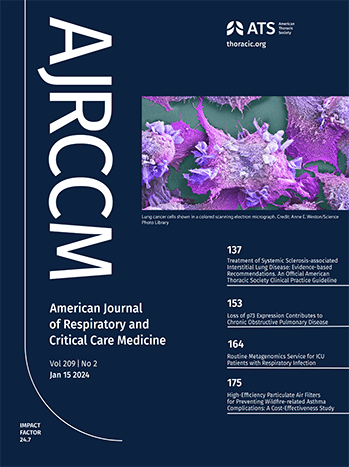Maternal Smoking and CC-16: Implications for Lung Development and COPD Across the Lifespan.
IF 19.4
1区 医学
Q1 CRITICAL CARE MEDICINE
American journal of respiratory and critical care medicine
Pub Date : 2025-10-07
DOI:10.1164/rccm.202504-0854oc
引用次数: 0
Abstract
RATIONALE Early-life lung function trajectories predict long-term respiratory health, including COPD risk. Club Cell protein 16 (CC16) is a key determinant of lung health, with low levels associated with impaired lung development, reduced lung function, and COPD. Cigarette smoking lowers CC16, but it is unknown whether maternal smoking leads to persistent CC16 deficiency from early life, thereby disrupting lung development and predisposing to COPD risk and progression Methods: CC16 expression was analyzed across 4 human cohorts, in plasma samples (COPDGene [n=1,062] and ECLIPSE [n=2,164]), nasal brushings (ALLIANCE [n=63]), and peripheral lung sections (LTRC [n=44]) from participants with and without a history of maternal smoking exposure. Lung histology and respiratory mechanics were assessed in WT and Cc16-/- mice with and without maternal smoking exposure. Recombinant human (rh)CC16 effects on lung maturation were assessed in embryonic murine lung explants. RESULTS Maternal smoking was linked to reduced circulating and airway CC16 in COPD patients, controls, and a preclinical murine COPD model. In human adults, lower CC16 correlated with accelerated lung function decline and emphysema progression, while in children it was associated with obstructive physiology and early small airway impairment. In both mice and humans, maternal smoking-induced CC16 reduction was accompanied by greater epithelial injury (fibrosis, inflammation, apoptosis, oxidative stress). In murine explants, smoking impaired lung branching, whereas rhCC16 restored branching via α2-integrin binding Conclusions: Maternal smoking reduces CC16 levels, disrupting lung development in ways that predispose to lifelong impairment of lung function and worse COPD outcomes. Defining the mechanisms by which CC16 regulates lung maturation is essential for establishing reliable outcome measures and designing trials aimed at preventing early COPD. This article is open access and distributed under the terms of the Creative Commons Attribution Non-Commercial No Derivatives License 4.0 (http://creativecommons.org/licenses/by-nc-nd/4.0/).母亲吸烟和CC-16:对肺部发育和慢性阻塞性肺病的影响。
早期肺功能轨迹预测长期呼吸系统健康,包括COPD风险。俱乐部细胞蛋白16 (CC16)是肺健康的关键决定因素,其低水平与肺发育受损、肺功能降低和COPD相关。吸烟会降低CC16,但尚不清楚母亲吸烟是否会导致早期持续的CC16缺乏,从而破坏肺部发育并易患COPD风险和进展。方法:分析了4个人类队列中CC16的表达,包括血浆样本(COPDGene [n= 1062]和ECLIPSE [n= 2164])、鼻刷(ALLIANCE [n=63])和周围肺切片(LTRC [n=44]),这些样本来自有和没有母亲吸烟史的参与者。对有和没有母亲吸烟暴露的WT和Cc16-/-小鼠的肺组织学和呼吸力学进行了评估。研究了重组人(rh)CC16对小鼠胚胎肺外植体肺成熟的影响。结果:在COPD患者、对照组和临床前小鼠COPD模型中,母亲吸烟与循环和气道CC16降低有关。在成人中,较低的CC16与肺功能加速下降和肺气肿进展相关,而在儿童中,CC16与阻塞性生理和早期小气道损伤相关。在小鼠和人类中,母体吸烟诱导的CC16减少伴随着更大的上皮损伤(纤维化、炎症、细胞凋亡、氧化应激)。在小鼠移植体中,吸烟损害肺分支,而rhCC16通过α2整合素结合恢复分支。结论:母亲吸烟降低CC16水平,破坏肺发育,易导致肺功能终身损害和COPD预后恶化。确定CC16调节肺成熟的机制对于建立可靠的结果测量和设计旨在预防早期COPD的试验至关重要。本文在知识共享署名非商业禁止衍生品许可4.0 (http://creativecommons.org/licenses/by-nc-nd/4.0/)的条款下开放获取和分发。
本文章由计算机程序翻译,如有差异,请以英文原文为准。
求助全文
约1分钟内获得全文
求助全文
来源期刊
CiteScore
27.30
自引率
4.50%
发文量
1313
审稿时长
3-6 weeks
期刊介绍:
The American Journal of Respiratory and Critical Care Medicine focuses on human biology and disease, as well as animal studies that contribute to the understanding of pathophysiology and treatment of diseases that affect the respiratory system and critically ill patients. Papers that are solely or predominantly based in cell and molecular biology are published in the companion journal, the American Journal of Respiratory Cell and Molecular Biology. The Journal also seeks to publish clinical trials and outstanding review articles on areas of interest in several forms. The State-of-the-Art review is a treatise usually covering a broad field that brings bench research to the bedside. Shorter reviews are published as Critical Care Perspectives or Pulmonary Perspectives. These are generally focused on a more limited area and advance a concerted opinion about care for a specific process. Concise Clinical Reviews provide an evidence-based synthesis of the literature pertaining to topics of fundamental importance to the practice of pulmonary, critical care, and sleep medicine. Images providing advances or unusual contributions to the field are published as Images in Pulmonary, Critical Care, Sleep Medicine and the Sciences.
A recent trend and future direction of the Journal has been to include debates of a topical nature on issues of importance in pulmonary and critical care medicine and to the membership of the American Thoracic Society. Other recent changes have included encompassing works from the field of critical care medicine and the extension of the editorial governing of journal policy to colleagues outside of the United States of America. The focus and direction of the Journal is to establish an international forum for state-of-the-art respiratory and critical care medicine.

 求助内容:
求助内容: 应助结果提醒方式:
应助结果提醒方式:


